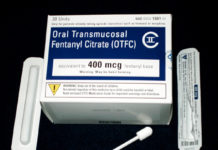campus professionals — from educators to student welfare and health center leaders — but hopes it will play a wider role.
“It also can be a tool for students, for parents and for loved ones, and for anyone involved in the campus community,” she said. “Even though it’s targeted to professionals who can now find these resources all in one place, it is also a tool for anyone who is able to play a role in preventing drug misuse. It has the potential to be a really huge resource.”
She believes a key section of the website is the ‘Help a Friend’ tab, which provides guidance on how to talk to someone you suspect might have a drug problem.
“Sometimes there’s a friend or a loved one who is acting differently, or you’ve noticed that maybe they are abusing or misusing a substance and you want to have a conversation with them because you’re concerned, but people often don’t know where to start,” Pfaff added. “It’s really important to be prepared to have that conversation. Knowing how to have a productive exchange and follow up on that is vital. It’s not just about the conversation, but following through to get someone help going forward.”















